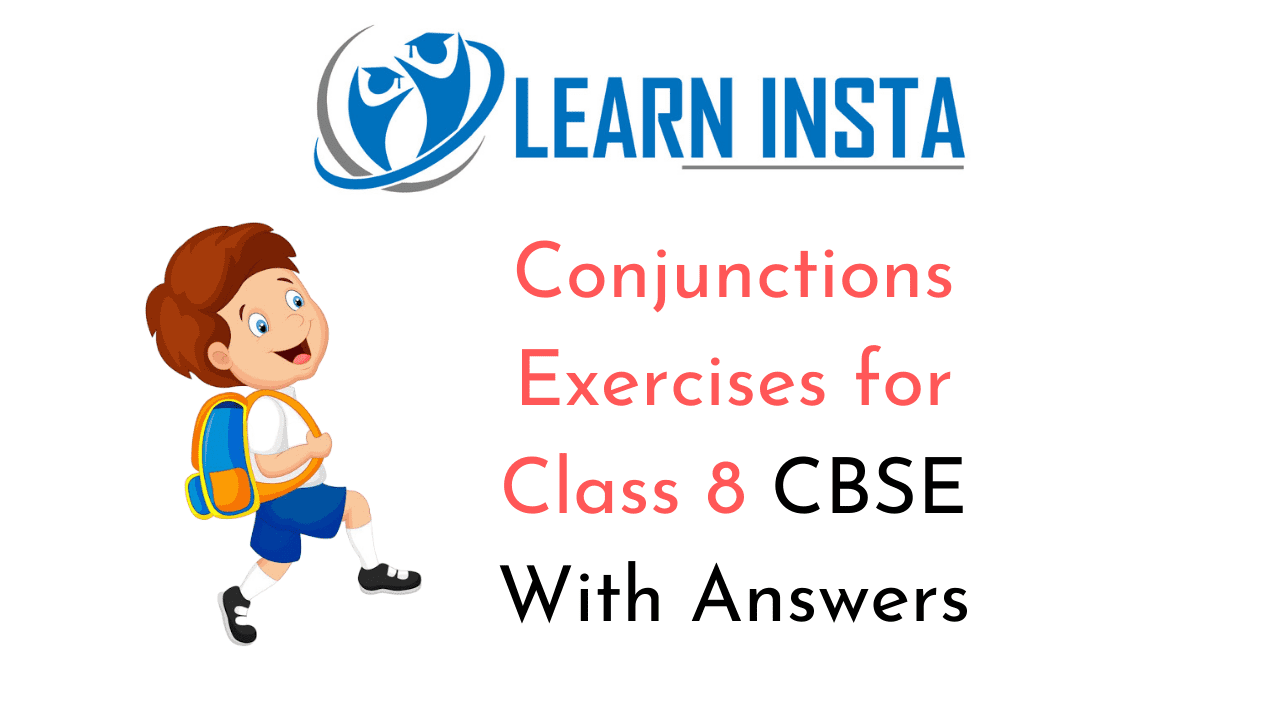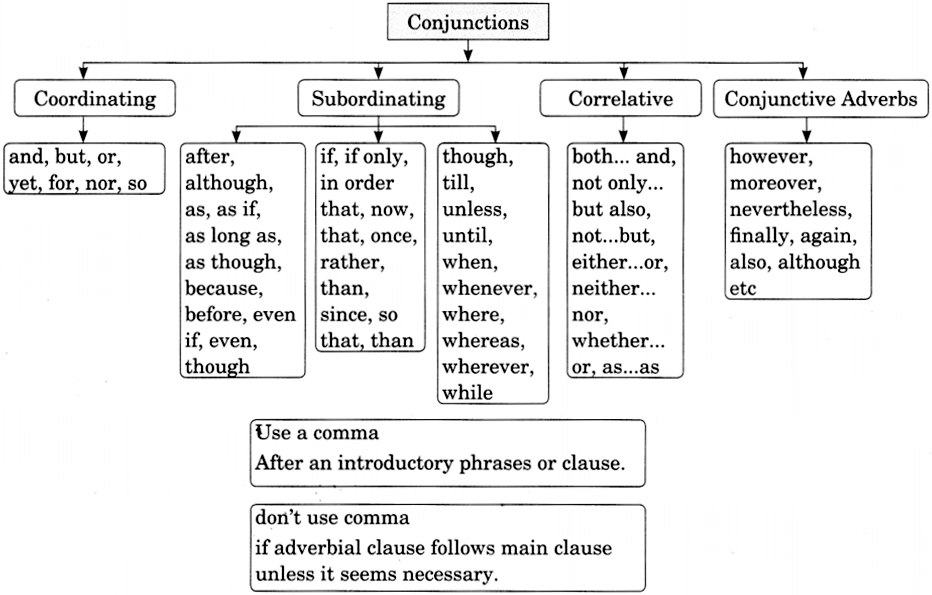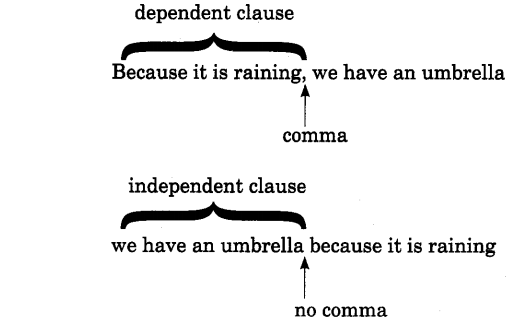
A conjunction is a part of speech that is used to connect words, phrases, clauses, or sentences. Conjunctions are considered to be invariable grammar particles, and they may or may not stand between items they conjoin.
This grammar section explains Online Education English Grammar in a clear and simple way. There are example sentences to show how the language is used. NCERT Solutions for Class 8 English will help you to write better answers in your Class 10 exams. Because the Solutions are solved by subject matter experts. https://ncertmcq.com/conjunction-exercise-for-class-8/
Online Education Conjunctions Exercises for Class 8 CBSE With Answers Pdf
Conjunction Exercise For Class 8
A conjunction is a connecting or linking word used to join phrases, clauses and sentences.

There are following types of conjunctions for, an, nor, but, or, yet, so
Conjunctions Exercises For Class 8
Co-ordinating Conjunctions
There are seven Co-ordinating conjunctions.
They give equal importance to the words or sentences they connect.
| for | and | nor | but | or | yet | so |
| F | A | N | B | 0 | Y | S |
Examples:
- Words: peanuts, cookies, and milk.
- Phrases: in the mountains, at the beach, or by the lakeside.
- Subordinate clauses: what you think, what you say, and what you do.
A coordinating conjunction joining two independent clauses creates a compound sentence and requires a comma before the coordinating conjunction.
Examples:
- Tom ate all the peanuts, so Phil ate the cookies.
- I don’t care for the beach, but I enjoy a good vacation in the mountains.
Conjunction Class 8
Correlative Conjunctions
either…or
both…and
neither…nor
not only…but also
These pairs of conjunctions require equal (parallel) structures after each one.

Conjunction Worksheet For Class 8
Conjunctive Adverbs
These conjunctions join independent clauses together.
The following are frequently used conjunctive adverbs. after all
| after all | in addition | next |
| also | incidentally | nonetheless |
| as a result | indeed | on the contrary |
| besides | in fact | on the other hand |
| consequently | in other words | otherwise |
| finally | instead | still |
| for example | likewise | then |
| furthermore | meanwhile | therefore |
| hence | moreover | thus |
| however | nevertheless |
Examples:
- The tire was flat; therefore, we called a service station.
- It was a hot day; nevertheless, the roofers worked on the project all day.
Coordinating conjunctions join equals to one another.
words to words – phrases to phrases – clauses to clauses.
Examples:
- word to word: Most children like cookies and milk.
- phrase to phrase: The gold is hidden at the beach or by the lakeside.
- clauses to clause: What you say and what you do are two different things.
Coordinating conjunctions usually form looser connections than other conjunctions do.
Examples:
- Marge was late for work, and she received a cut in pay. (very loose)
- Marge was late for work, so she received a cut in pay.(loose)
- Because Marge was late for work, she received a cut in pay. (The subordinate conjunction because creates a tighter link between the two ideas.)
Coordinating conjunctions go in between items joined, not at the beginning or end.
Examples:
- Correct: I like coffee, but I don’t like tea.
- Incorrect: But I don’t like tea, I like coffee.
- Punctation with coordinating conjunctions:
When a coordinating conjunction joins two words, phrases, or subordinate clauses, no comma should be placed before the conjunction.
Examples:
- Words: cookies and milk.
- Phrases: at the beach or by the lakeside.
- Subordinate clauses: what you say and what you do
A coordinating conjunction joining three or more words, phrases, or subordinate clauses creates a series and requires commas between the elements.
- Punctuation: Place a semicolon before the conjunctive adverb and a comma after the conjunctive adverb.
Conjunction Exercise Class 8
Subordinating Conjunctions
These words are commonly used as subordinating conjunctions after
| after | in order (that) | unless |
| although | insofar as | until |
| as | in that | when |
| as far as | lest | whenever |
| as soon as | no matter how | where |
| as if | now that | wherever |
| as though | once | whether |
| because | provided (that) | while |
| before | since | why |
| even if | so that | |
| even though | supposing (that) | |
| how | than | |
| if | that | |
| in as much as | though | |
| in case (that) | till |
Subordinating conjunctions also join two clauses together, but in doing so, they make one clause dependent (or “subordinate”) upon the other.
Examples:

Put the two clauses together.
Because it is raining, we have an umbrella.
Or
We have an umbrella because it is raining.
A subordinating conjunction may appear at a sentence beginning or between two clauses in a sentence.
A subordinate conjunction usually provides a tighter connection between clauses than a coordinating does.
Loose: It is raining, so we have an umbrella.
Tight: Because it is raining, we have an umbrella.
Conjunctions Exercises For Class 8 With Answers
Punctuation Note:
When the dependent clauses is placed first in a sentence, use a comma between the two clauses. When the independent clause is placed first and the dependent clause second, do not separate the two clauses with a comma.
Examples:

Conjunctions Exercises Solved Examples for Class 8 CBSE
Conjunction For Class 8 Question 1.
Fill in the blanks with appropriate conjunctions.
(i) We started early _____________ we might not miss the show. (because/ so that / on condition that)
(ii) I can help you _____________ you tell me the truth. (so / provided / unless)
(iii) He is both scholarly _____________ cultured. (also / as well / and / as well as)
(iv) He looks _____________ he is ill. (like / as / though / as if)
(v) You must apologize; _____________ you will be punished. (unless / whether / but / otherwise)
(vi) He tiptoed into the class _____________ he should disturb the students. (if / unless / lest)
(vii) _____________ she was angry, she said nothing. (Though / If / Even if)
(viii) We were tired _____________ we had been running for hours. (so / because / while)
Answer:
(i) so that
(ii) provided
(iii) and
(iv) as if
(v) otherwise
(vi) lest
(vii) Though
(viii) because
Conjunctions Exercises For Class 8 Cbse With Answers Question 2.
Choose the correct conjunction.
(i) I need to work hard _____________ I can pass the exam.
(ii) _____________ he was the best candidate, he didn’t win the elections.
(iii) _____________ you come back from your trip, we’ll meet to discuss the problem.
(iv) They said that movie was fantastic, _____________ I watched it.
(v) _____________ he was very ill, he didn’t take any medicine.
(vi) I don’t know _____________ I can buy a pair of jeans.
(vii) She went to the shops _____________ couldn’t find anything that could fit her needs.
(viii) Everybody likes him because he is nice _____________ helpful.
(ix) _____________ he was angry with her, he didn’t utter a word.
(x) Keep quiet _____________ go out.
Answer:
(i) so that
(ii) Although
(iii) When
(iv) so (v) although
(vi) where
(vii) but
(viii) and
(ix) Since
(x) or
Conjunctions Exercises Practice Examples for Class 8 CBSE
Exercise Of Conjunction For Class 8 Question 1.
Fill in the blanks with the correct conjunctions.
(i) Nitin had lost his way home _____________ he was not scared. (and / but)
(ii) He knew he was in the woods _____________ he could hear the sound of some wolves howling. (as / and)
(iii) His legs began to hurt _____________ he kept walking. (but/or) The road forked into two narrow paths.
(iv) He could – go left _____________ right. (either – or/ neither – nor) He wondered which road would lead him to his village. He saw that one of the paths looked more worm out than the other.
(v) It had less grass growing. _____________ it also had imprints of footsteps. (or/and)
(vi) Nitin was confident that this path would lead him to his village _____________ people must have walked on it. (because / or)
(vii) With hope in his heart, Nitin began walking on the chosen path _____________ within half an hour he could see smoke rising into the sky. (but/ and)
(viii) He was delighted _____________ fire smoke indicated that there were people close by. (but / because)
(ix) Nitin was so excited that _____________ his legs were aching, he began running. (because/ although)